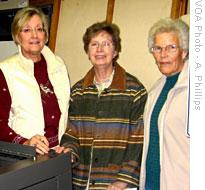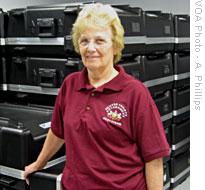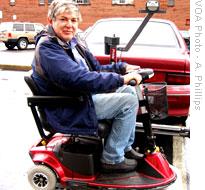voa标准英语2008年-As Election Nears, Grassroots America Also Gear(在线收听)
 |
| These ladies are official Centre County poll workers. They have just received training in the county's new optical-scan machines |
As the two-year-long presidential campaign process approaches its Tuesday climax, the residents of Centre County, Pennsylvania, are being barraged by a near-endless round of TV ads and telephone "robo calls." However, it may be door-to-door canvassing by familiar locals like Joanne, a supporter of Democratic presidential candidate Barack Obama, that will win over the majority of the county's crucial undecided voters before the polls open on Election Day.
"I am a neighbor-to-neighbor volunteer," says Joanne, "which means I go around [to the people in my community] and help make them aware of the issues, and, most importantly, help them to know how important it is to get out and vote."
Student Organizers Urge Peers to Vote
With over 43 thousand registered students in its University Park campus alone, Penn State University is one of the largest communities in central Pennsylvania. That's where you see "information tables" set up in the student center where students hand out campaign stickers for their preferred candidates and try to get their peers to register to vote.
Sophomore Zachary Zabel, president of Penn State Students for Obama, says all that hard work has been paying off for his candidate.
"Over the last few months, we've built a large grassroots network through meetings, Facebook, just 'tabling' in general, and signing up volunteers," says Zabel, adding, "Now we are getting into 'get out the vote.' We have, say, three or four hundred students who come in every week and make phone calls and go canvassing."
For now, polls indicate that Obama leads McCain in State College, Pennsylvania. But Zabel says making sure that the students who have registered actually vote on November 2 can make all the difference in Centre County - and perhaps even the state and the nation.
"… So we are going to be dragging students to the polls on Election Day [and] make it fun," Zabel says. "[We] tell them that this is the most important election you'll ever be involved in your lives."
Elections Board Prepares for Record-Large Turnout
 |
| Joyce McKinley, the director of Centre County, Pennsylvania's Board of Elections, oversees all aspects of voting in her county |
Every election is important to Joyce McKinley, who has been Centre County's director of elections for nearly 20 years. Training the poll clerks, inspectors and precinct judges who will be manning the county's polling stations - and their new optical-scan voting machines - is only one of McKinley's jobs. McKinley has also been responsible for ensuring that all ballots are properly prepared and all absentee ballots are accounted for and tabulated, as well as scores of other tasks. And that's all before Election Day.
"The average citizen has no idea what is involved in the preparation for the election," she says with a happy sigh. "[It's] pretty complicated. Do we anticipate lines? Yes. It will be a high voter turnout. But my goal is to have a successful election."
Disability Rights Activist Works to Make Sure Disabled Have Access to Polls
Merely getting to the polls on Election Day is often a challenge for the elderly and disabled. But with the record-large voter turnout expected this year, the hurdles facing these individuals are both higher and more numerous, says Joel Solkoff. He's a wheelchair-bound disability rights activist from State College.
 |
| Joel Solkoff, a disability rights activist, is working hard to make sure the disabled and the elderly get to vote easily |
"One [hurdle] is because some of the boards of elections are not wheelchair accessible," says Solkoff, adding that the frigid weather can also be a major challenge. "And it can be difficult casting ballots because the software that is being used at the polls is new, and everyone no one that using software by people who are not trained can break down."
In anticipation of these and other problems, Solkoff has been focusing on "absentee" ballots and so-called "alternative ballots," whose purpose, in his words, is "to try to get the voters to cast their ballots outside the polling place but in such a way that their votes are counted."
Solkoff believes that if enough old and disabled people vote, it could help ensure that candidates favorable to the Social Security and Medicare benefits they depend on will be elected, both locally and nationally. That, says Solkoff, is why he is going to work overtime until Election Day to transport people to the county offices where alternative ballots are cast and counted.
It's just one of many efforts taking place at the grassroots and official levels to ensure that America's complicated election process works as it should.